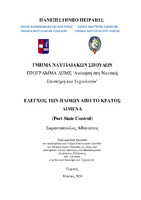Έλεγχος των πλοίων από το κράτος λιμένα
Port state control

Προβολή/
Λέξεις κλειδιά
Ασφάλεια ναυσιπλοΐας ; Προστασία θαλασσίου περιβάλλοντοςΠερίληψη
Η παρούσα εργασία αναλύει το νομικό πλαίσιο του ελέγχου των πλοίων υπό ξένη σημαία από το κράτος λιμένα και συγκρίνει το πλαίσιο αυτό με εκείνο που εφαρμόζεται στον έλεγχο του κράτους σημαίας, σε συνάρτηση με τη δικαιοδοσία εκάστου εξ΄ αυτών, όσον αφορά τα ζητήματα της ασφάλειας της ναυσιπλοΐας και της προστασίας του θαλασσίου περιβάλλοντος.
Στο πρώτο μέρος παρουσιάζονται βασικές έννοιες της βιομηχανίας της ναυτιλίας, όπως ο Διεθνής Ναυτιλιακός Οργανισμός «Δ.Ν.Ο.», η Διεθνής Σύμβαση για την Ασφάλεια της Ζωής στη Θάλασσα «Solas», η Σύμβαση για τα πρότυπα Κατάρτισης, Πιστοποίησης και Επικύρωσης των Ναυτικών «Stcw», η Διεθνής Σύμβαση για την Προστασία του Θαλασσίου Περιβάλλοντος «Marpol», η Διεθνής Σύμβαση για το δίκαιο της θάλασσας «Unclos», οι Θαλάσσιες ζώνες καθώς και κάποια σημαντικά περιστατικά-ατυχήματα που συνέβαλαν στη λήψη αποφάσεων για τροποποίηση-βελτίωση των κανονισμών.
Στο δεύτερο κεφάλαιο αναλύεται η δικαιοδοσία και ο έλεγχος των αλλοδαπών πλοίων από το κράτος λιμένα. Ειδικότερα, παρουσιάζεται η νομική βάση του εν λόγω καθεστώτος, το Ευρωπαϊκό νομικό πλαίσιο και η έκταση της δικαιοδοσίας του κράτους λιμένα επί τη βάση των ισχυόντων κανόνων δικαίου.
Εν συνεχεία, παρουσιάζεται ο μηχανισμός ελέγχου από το κράτος λιμένα, οι κατευθυντήριες οδηγίες του Διεθνή Ναυτιλιακού Οργανισμού, η ανάλυση των καθεστώτων των ελέγχων αυτών, η αποτύπωση του Μνημονίου των Παρισίων και του Αμερικάνικου συστήματος επιθεώρησης πλοίων καθώς και ο ρόλος των Αναγνωρισμένων Οργανισμών.
Στην επόμενη ενότητα ακολουθεί η παρουσίαση της δικαιοδοσίας και του ελέγχου των πλοίων από το κράτος σημαίας. Αποτυπώνονται οι έννοιες της εθνικότητας και νηολόγησης πλοίου, οι υποχρεώσεις του κράτους σημαίας με τις υφιστάμενες υποχρεώσεις αυτού, ο θεσμός του γνήσιου συνδέσμου και των σημαιών ευκαιρίας και των ανοικτών νηολογίων.
Ακολουθεί η αποτύπωση της δικαιοδοσίας του παράκτιου κράτους σε πλοία υπό ξένη σημαία, σε συνάρτηση με τις παράκτιες ζώνες καθώς και η εφαρμογή της Ελληνικής έννομης τάξης επί ξένων και επί πολεμικών πλοίων εντός Ελληνικών χωρικών υδάτων.
Στο τελευταίο κεφάλαιο της παρούσας μελέτης πραγματοποιείται η συγκριτική ανάλυση της δικαιοδοσίας και του καθεστώτος μεταξύ του ελέγχου του κράτους λιμένα και του κράτους σημαίας. Γίνεται προσπάθεια να αποτυπωθεί τι προσδίδει τελικά ο έλεγχος του κράτους λιμένα σε πλοία με ξένη σημαία στην ναυτιλιακή βιομηχανία, σε ότι αφορά την ασφάλεια της ναυσιπλοΐας και την προστασία του θαλασσίου περιβάλλοντος και εξάγονται συγκεκριμένα συμπεράσματα σχετικά με την αναγκαιότητα της ύπαρξης ελέγχου από τα κράτη λιμένα.


